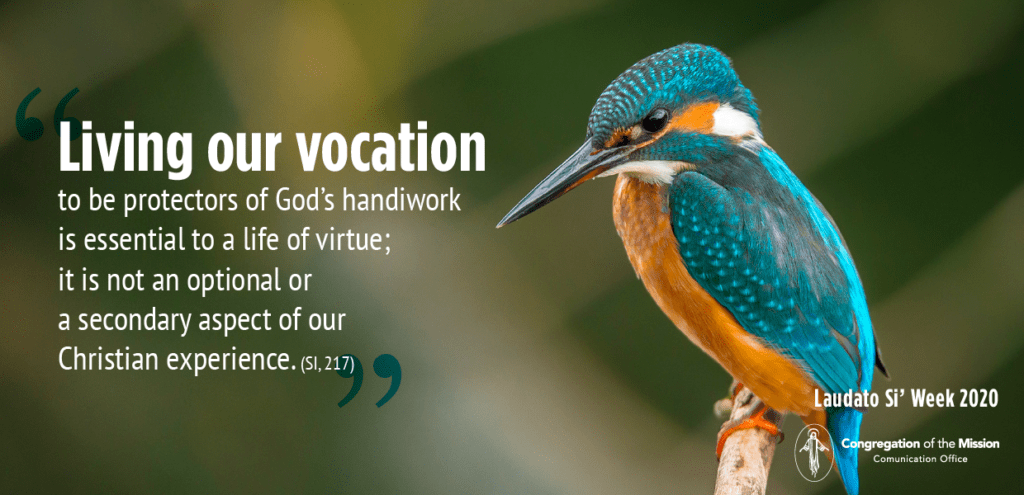
“I renew my urgent call to respond to the ecological crisis. The cry of the earth and the cry of the poor cannot continue.” With these words, Pope Francis invites us all to celebrate the 5th anniversary of the encyclical letter Laudato Si’: On the Care of the Common Home. Through a video message, the Pope encourages the Church to celebrate Laudato Si Week, May 16 to 24, 2020. “Let´s take care of creation, a gift from our good Creator God.”
If we had pictured a week of many “pro-environmental activities”, the COVID-19 pandemic and the restrictions that it entails has caused a reorientation what it means to celebrate this important date. We are certainly are not going to spend the week picking up litter from the streets, planting seedlings in green places or holding forums on environmental issues – although they are all important activities.
How, then, we can mark this significant date when the Pope gave to the Church and the world a profound reflection on the environmental crisis and our responsibility to repair it?
Perhaps the key to the answer is found in the language of the Pope in the encyclical itself, particularly in two widely used terms: ecological conversion and integral ecology.
We can take advantage of the peculiarity of this time at home for an examination of conscience and ask ourselves if the ecological conversion that the Pope has invited to live has taken deep root in our lives. True conversion changes our perspective and blossoms with evidence of a new way of acting and being. All conversion begins with the humble recognition that “we have sinned”. In this case, we accept that our relationship with creation is not what the Creator expects of us; that humanity has forgotten its place in the creative plan of God, and has been wrong in overemphasizing “dominion over” creation instead of maintaining the harmony established by the Creator from the beginning.
But it is not enough to remain under the cross of Good Friday, we are invited to also live the resurrection and the new life God desires for humanity and all creation. It is not too late to return to the correct road and restore right relationship with Mother Earth, as “the Creator does not abandon us; he never forsakes his loving plan or repents for having created us” (LS 13). And just as we are all involved in the degradation of creation, we all play an important part in restoring it. In celebrating Laudato Si’ Week in this time of Easter gives Christians the opportunity to deepen the ecological conversion,
“whereby the effects of their encounter with Jesus Christ becomes evident in their relationship with the world around them” (LS 217).

The true conversion in our life never remains in thoughts and emotions, but is joyfully manifested in concrete action. Integral ecology, as the Pope present it, is not a compartmentalized ecology in our life and society; it is not so much something that we “do” at specific moments, but something that we “live” daily. Integral ecology effects all aspects of our lives: from the origin of our food to the mode of transportation we choose; from the clothes that we put each day to decisions against consumerism we make.
Integral ecology cannot be only individual, knowing that the crisis facing humanity requires a response from humanity itself. “Social problems must be addressed by community networks and not simply by the sum of individual good deeds” (LS 219). Accumulated individual efforts will never reach the necessary goals if we continue with a linear system of extraction, production, consumption and discard in a finite world. Local initiatives are not enough if we continue with national politics more concerned with the next elections than the next generations. Integral ecology requires creativity in imagining and implementing new economic and social relations that respect human life and all life.
And finally, integral ecology affirms that we are part of a whole, of one creation. It is of no help to refer to humanity as a plague or virus to “nature”, as if we existed outside of it. The Pope states that “as believers, we do not look at the world from without but from within, conscious of the bonds with which the Father has linked us to all beings” (LS 220).
Although we are not going to carry out the activities planned in the worldwide Church to mark this 5th anniversary, we can live Laudato Si Week by deepening our ecological conversion to bring it more in harmony with the heart of the Creator and committing ourselves to living an integral ecology in all its aspects. Praise be!

